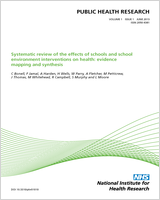Included under terms of UK Non-commercial Government License.
NCBI Bookshelf. A service of the National Library of Medicine, National Institutes of Health.
Headline
Study successfully tested the feasibility of all aspects of a behaviour change intervention study which used text messages to deliver a brief alcohol intervention to disadvantaged men in early mid-life. The study demonstrated the potential to recruit, engage and modify drinking behaviour among disadvantaged young to middle-aged men.
Abstract
Background:
Socially disadvantaged men suffer substantial harm from heavy drinking. Brief alcohol interventions are effective in reducing consumption when delivered via health care. There is a need for tailored brief interventions for disadvantaged men who seldom attend health care.
Objectives:
(1) To investigate the best ways to recruit and retain disadvantaged men in a study aimed at reducing the frequency of heavy drinking. (2) To identify the type of content and timing of the delivery that is most likely to engage disadvantaged young to middle-aged men in an intervention delivered by text messages. (3) To determine whether or not the intervention is likely to be an acceptable way to influence the frequency of heavy drinking.
Design:
A three-phase study involving the development of the recruitment strategy and the intervention, an assessment of the feasibility of a randomised controlled trial, and a post-study evaluation.
Setting:
Community-based study, conducted in Dundee, UK.
Participants:
Disadvantaged men aged 25–44 years who had two or more episodes of heavy drinking (≥ 8 units in a single session) in the preceding month. Two recruitment strategies were employed: recruitment through general practice (GP) registers and recruitment through a community outreach strategy.
Interventions:
Focus groups explored drinking motives and behaviours of the target group. The intervention also drew on reviews of the literature on: alcohol brief interventions, text message studies, communication theory and behaviour change theories and techniques. The intervention group received 36 text messages with images sent over a 28-day period.
Main outcome measures:
The outcome measures evaluated the likely success of a full trial: recruitment of the participants; construction and delivery of a theoretically and empirically based intervention that successfully engages disadvantaged men; potential for the intervention to influence binge drinking.
Results:
The focus group analyses identified that personal experience and knowledge of the harmful effects of alcohol was widespread. Furthermore, there was a discrepancy between frequent binge drinking and perceived social expectations and duties. This could usefully be targeted in the intervention. Theoretically and empirically based behaviour change strategies were successfully rendered in attractive, colourful, brief text messages. Both recruitment strategies (GP registers and community outreach) proved successful and a total of 67 men were recruited, exceeding the target of 60. The participants were at high risk of harm because of frequent episodes of heavy binge drinking. Baseline interviews established that those recruited through community outreach drank substantially more and had more frequent binge drinking sessions than those recruited through GP registers. Retention at follow-up was 96%. Extensive process evaluation was conducted. The evaluation showed that 95% of text messages were successfully delivered to participants' telephones. Furthermore, there was a high level of engagement with text messages which sought responses. Most men replied to these texts, often giving carefully structured personal responses. Analyses of the responses indicated a high level of engagement with key components of the behaviour change strategy. Post-trial evaluation showed high levels of satisfaction with the intervention.
Conclusions:
This study has shown that disadvantaged men can be recruited and retained in an alcohol intervention trial. A theoretically and empirically based intervention was successfully delivered by text message. Furthermore, the messages were well received and elicited the types of response intended. A full trial of the intervention, incorporating a cost-effectiveness study, should be carried out.
Study registration:
This study is registered as ISRCTN10515845.
Funding:
The National Institute for Health Research Public Health Research programme.
Contents
- Scientific summary
- Chapter 1. Structure of the report
- Chapter 2. Research objectives
- Chapter 3. Introduction
- Chapter 4. Understanding drinking motives and behaviours
- Chapter 5. Developing the text messages
- Chapter 6. Recruitment strategies
- Chapter 7. Randomisation and baseline characteristics
- Chapter 8. Retention strategy
- Chapter 9. Outcome assessment
- Chapter 10. Novel methods for process evaluation
- Chapter 11. Post-trial assessment
- Chapter 12. Summary and conclusions
- Acknowledgements
- References
- Appendix 1 Study protocol
- Appendix 2 Letter of invitation, participant information leaflet and consent form
- Appendix 3 Screening questionnaire
- Appendix 4 Baseline questionnaire
- Appendix 5 Follow-up questionnaire
- Appendix 6 Post-trial assessment
- List of abbreviations
Article history
The research reported in this issue of the journal was funded by the PHR programme as project number 09/3001/09. The contractual start date was in March 2010. The final report began editorial review in January 2012 and was accepted for publication in January 2013. The authors have been wholly responsible for all data collection, analysis and interpretation, and for writing up their work. The PHR editors and production house have tried to ensure the accuracy of the authors' report and would like to thank the reviewers for their constructive comments on the final report document. However, they do not accept liability for damages or losses arising from material published in this report.
Declared competing interests of authors:
none
- NLM CatalogRelated NLM Catalog Entries
- Reducing alcohol-related harm in disadvantaged men: development and feasibility ...Reducing alcohol-related harm in disadvantaged men: development and feasibility assessment of a brief intervention delivered by mobile telephone
Your browsing activity is empty.
Activity recording is turned off.
See more...
